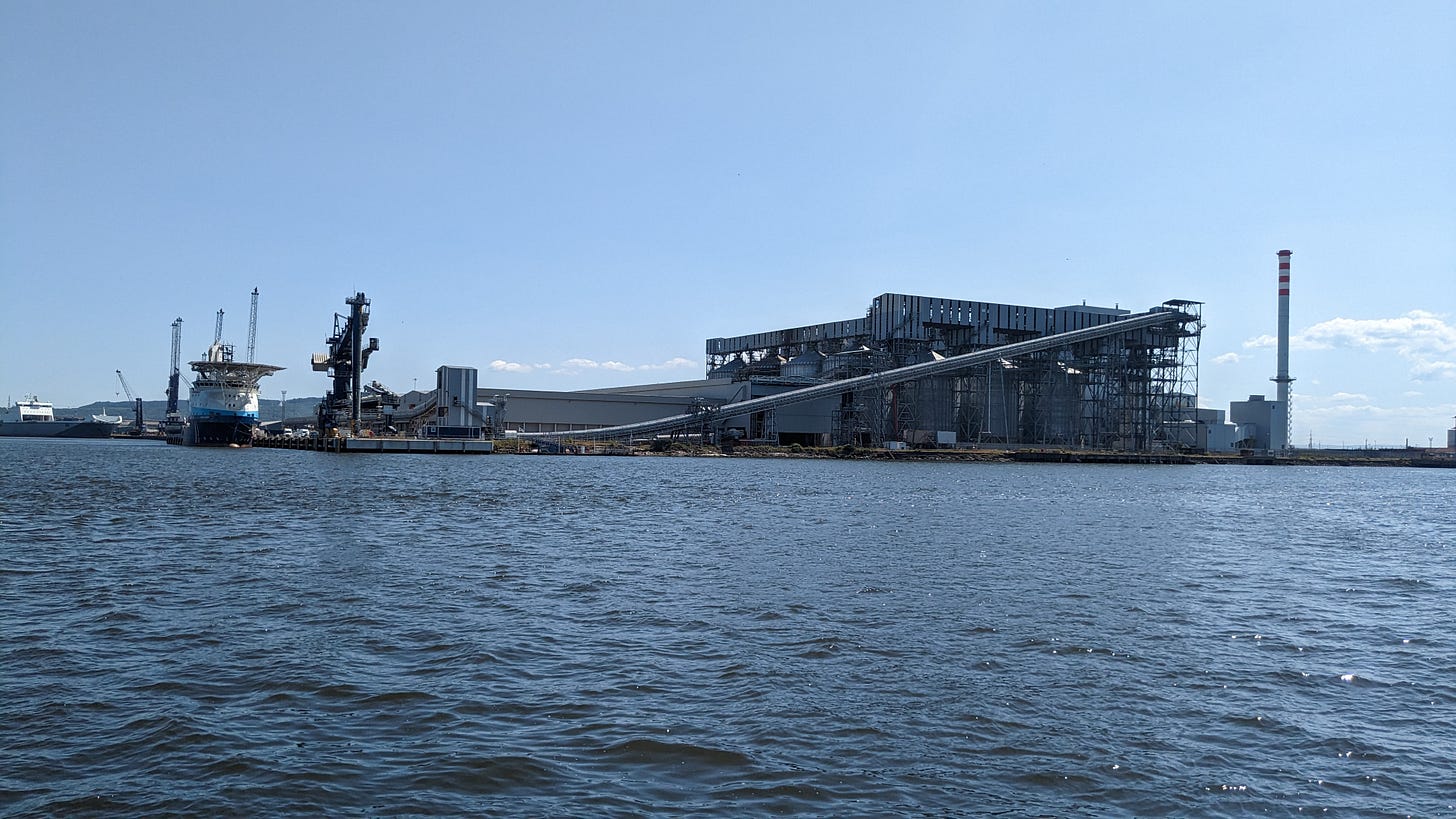Northumbrian Water to build 4km discharge pipe into Tees Bay
Plus: Council budgets increased, Teesside power plant restructure, the latest in FOI requests
We’ve nearly made it. Are you feeling festive yet? This is the 18th edition of The Teesside Lead, and I am well and truly ready for Christmas.
There won’t be a newsletter on Wednesday (“You, boy, what day is it?”), so the next issue dropping into inboxes will be next Sunday. Here’s hoping some news happens over the next seven days, eh?
There certainly has been plenty of news to write about in this edition, though, starting with the huge news, exclusively revealed by The Teesside Lead, that Northumbrian Water will be progressing plans to build an outfall pipe for nutrient-rich water into Tees Bay.
Further up the river Tees, there’s news of restructuring for a financially troubled power plant, and I dive into the government announcement of an increase in local authority funding to see what it means for the Tees Valley’s five councils.
For paid subscribers, details on my latest FOI battles, including taking a decision to a tribunal to be decided by a judge, and how TVCA got a telling-off from the information watchdog.
If you can support my work by taking a paid subscription, a £4.99 monthly sub works out at 63p per edition, and an annual sub basically gets you two months for free. All paid subs get full access to The Teesside Lead as well as The Lead’s national title and its superb coverage of Westminster and the wider UK.
Paid subs keep the lights on, but free subs give power to my arm, so sign up for free to get The Teesside Lead straight to your inbox if you haven’t already!
This is independent, investigative journalism covering the Tees Valley - something you won’t get anywhere else.
Get in touch at teesside@thelead.uk or via social media: Bluesky or X-formerly-known-as-Twitter.
Thanks for reading!
Northumbrian Water are set to build a 4km discharge pipe into Tees Bay to release nutrient-rich water from its Bran Sands water treatment plant.
The water company proposed a “nature based solution” to deal with nutrient-rich water into the Tees Estuary, including planting sea grasses, however regulator Ofwat has this week said it will give the company £217m to build the outfall pipe. The 4km outfall pipe was not Northumbrian Water’s first choice.
On Thursday Ofwat confirmed budgets for water companies’ plans for 2025-30, resulting in price increases for customers, but not as high as the increases asked for by the companies.
One of the documents submitted by Northumbrian Water to Ofwat proposing costs for the next five years, and seen by The Teesside Lead, show three options for its Bran Sands treatment plant.
The Tees Estuary is a protected in law with higher standards than other areas for nutrient discharge from water treatment works.
In order to mitigate its nitrogen discharge, Northumbrian Water proposed increasing biodiversity at Seal Sands with saltmarsh and seagrass restoration. It costed this at £47.7m, and chose it as its “preferred option” because it had the “least cost”.
“This proposal,” they write, “restores the protected area to favourable status whilst removing the obligation for developers to offset their growth.”
This would have been an unusual and novel approach for dealing with nutrient-rich discharge in the water industry, and subsequently Ofwat has chosen the second most expensive option proposed by Northumbrian Water - the long sea outfall.
The logic behind discharging nutrient-rich water at sea is that the higher volume of water would dilute the concentration of nitrogen to mitigate the environmental impact, because discharge from Bran Sands treatment plant wouldn’t be within legal limits.
In Thursday’s Final Determination from Ofwat - its response to budget proposals from water companies - prices for Northumbrian Water’s customers will increase by 6 percent next year. The company priced the long sea outfall - its second choice for dealing with nutrient-rich water in the Tees - at £259m, but the regulator has only granted them £217m to build it.
Last year Northumbrian Water CEO Heidi Mottram received an overall pay packet of £842,000, which included a bonus of more than £200,000.
On Friday, a spokesperson for Northumbrian Water told me: “Following the announcement of the Final Determination yesterday we are still reviewing this and still working through our plans for Bran Sands.”
In its proposals to Ofwat, Northumbrian Water says the long sea outfall would have “capacity to accept other effluent streams from other significant independent operators (independent industry currently being the largest impacting sector).
With development of the adjacent Teesworks site, Northumbrian Water suggests its neighbours could also contribute to the financial burden of building the 4km outfall pipe.
“[The long sea outfall] has been designed to accommodate at least 30 years of growth at Bran sands plus additional flow, so could accept third party contributions towards its construction and operation from other industrial users on Teesside,” it says.
Campaigners have argued development of Teesworks - on the site of the highly-polluted former Redcar steelworks - was responsible for the deaths of thousands of crustaceans along a 70km stretch of coastline in October 2021. However, an investigation commissioned by the government proved inconclusive, stating a new virus was “as likely as not” to be the cause.
In the wake of the crustacean deaths the Department for Food, Environment and Rural Affairs (Defra) blamed an algal bloom for the deaths.
One of the consequences of discharging nutrient-rich water to water bodies is the growth of algae.
After Ofwat’s decision for Northumbrian Water to pursue the 4km outfall pipe, an Environment Agency spokesperson told me: “We are aware that Northumbrian Water has proposed a Long Sea Outfall to reduce the amount of pollution entering the Tees Estuary.
“The Environment Agency is supportive of this proposal in principle, but it will be subject to our normal permitting approval processes.
“We will ensure the water environment is protected and enhanced by any scheme approved.”
Teesside biomass power plant restructures (again)
You’ve probably heard of Net Zero Teesside - the new gas-fired power station to be built on the Teesworks site, with carbon capture technology added to bury harmful emissions under the sea.
But did you know about MGT Teesside?
The company runs the Tees Renewable Energy Plant (TeesREP) biomass power station located on the banks of the river Tees on land owned by PD Ports. It’s owned by Australian financial giants Macquarie (yes, the same who bought a 40-year lease of the SeAH Wind site for £93.3m cash) along with Danish Pension group PKA.
It’s had a patchy, stop-start beginning to life since construction ended late in 2022, with faults being found during testing leading to components being sent away for repairs, leading to contractors being temporarily laid-off at the start of 2023. An emergency round of fundraising in Summer 2023 successfully secured £80m to stop the company going bust.
Last week it announced yet another restructuring of the company which has raised another £85m cash injection.
In its latest accounts to year-end 2023, MGT Teesside recorded its first revenue at £4m, against a loss of nearly £220m. This was caused by an impairment charge - a huge devaluation of the value of the plant itself.
Around 5% of the UK’s energy is created by burning biomass, usually in the form of wood pellets.
It’s argued that biomass is carbon neutral as regrowth of trees offsets carbon released by burning, although this doesn’t take into account the emissions generated by transporting pellets to power stations.
Tees Valley councils see average increase of 8% in budget funding
The government has published its proposed settlements for local authorities budgets for the next financial year, with Tees Valley councils receiving huge uplifts in comparison to recent years.
Middlesbrough Council will see an 8.8 percent uplift in core spending power compared to 2024-25, with its budget raised from £180.5m to £196.3m It will come as a relief to council officers who were looking to make £7m of cuts next year.
Redcar & Cleveland gets the next-highest percentage increase at 8.6 percent, seeing its budget raised from £162.9 to £176.9m, followed by Hartlepool at 8.4 percent. Hartepool’s budget for 2025-26 is £130.2m compared to £120.1m this year.
Hartlepool Borough Council was also looking to make millions of pounds’ worth of cuts to balance next year’s books until this week’s announcement. The town’s MP, Jonathan Brash, said: “Hartlepool is millions, and millions, and millions of pounds better off than they were expecting to be as a result of the positive decisions being taken by this government.”
The lowest percentage increase in the region is for Darlington, who get an increase in spending of 7.4 percent from £119.6m to £128.5m. The average increase for councils across England is 3.5 percent.
Stockton-on-Tees’ council budget increases from £204.8m to £220.6m, an increase of 7.7 percent.
As the year comes to an end it’s a good time to look back on the year in FOIs. My FOIs wrapped, if you will.
In 2024 I’ve submitted 42 freedom of information requests, which isn’t that bad considering the few fallow months over the summer where I was making the most of the good weather in the transition from full-time employment to freelance journalist.






